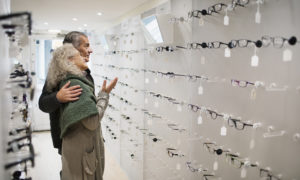By Diane Palombi, OD

Sept. 12, 2018
How well do you know recent optometry graduates, some of whom may end up as associates in your practice? A recent conversation illuminated their preferences regarding practice ownership, and plans for the future.
I had the opportunity to interview students from the 2018 graduation class of the University of Missouri – St Louis College of Optometry. The gender of the 37 graduates was almost evenly split at 54 percent women and 46 percent men.
Do You Want to Own Your Own Practice?
I graduated from optometry school in 1985. At that time, it was not usual for new graduates to open solo private practices immediately after graduation and passing the state boards. I had several classmates of both sexes that did just that. In those days there were many solo private practice doctors in our region. That seemed the only way to practice optometry. The solo private practice was presented in optometry college as the ideal practice situation, and it was what we aspired to. Now that three decades have passed, I was curious about how current optometry college graduates would like to practice.
So, my first question to the graduates was whether they would ever want to own their own practice. The men were highly interested in practice ownership with a resounding 88 percent yes response and a 12 percent maybe. None of the men said no. The women felt differently. Forty-five percent responded with a yes, 30 percent with a maybe and 25 percent with a no.
Do You Want a Solo or Group Practice?
What I found very interesting was the graduates’ response to my next question: Of those who wanted to own a practice, did they want a solo, small-group or large-group setting? Only one graduate wanted a solo practice, and that person was a woman. One man said he would own either a solo or small-group practice. The majority of the graduates were interested in small-group practices. I had one female respondent who said she would prefer a large-group setting.
Buy a Practice or Start Cold?
I then inquired as to whether the graduates would prefer to buy an existing practice or start cold. The woman, who wanted to open a solo private practice, planned to start her practice cold. The rest of the respondents preferred to buy into an existing practice.
When Will You Open Your Practice?
As a time frame for starting their practice, very few–just 10 percent–of the graduates planned to immediately open a practice. The men, on average, planned to wait 2-3 years, while the women averaged around five years. Some of the women thought it might take them as long as 10 years to open a practice.
What Are the Biggest Obstacles to Practice Ownership?
Money was the biggest obstacle to opening a practice for 60 percent of the graduates. Business skills was the second-greatest obstacle at 25 percent. Other impediments to practice ownership included student loans, finding a new patient base, a competitive market, insurance accreditation, finding a location, finding the right practice to buy into, time constraints and decreased reimbursements with increasing debt/expenses.
Did You Get the Business Skills You Needed in Optometry School?
I also wanted to know whether the practice management course the graduates took in optometry school was sufficient preparation for practice ownership. Seventy-seven percent said no, 19 percent said maybe and 4 percent said yes. One student commented that more coding and billing instruction would have been helpful. Another responded that he would have to do more research on business management on his own before opening a practice.
Why Does Practice Ownership Appeal to You?
Most of the responses in favor of practice ownership had to do with freedom, independence, control and autonomy. Others mentioned life factors such convenience, family, quality of life, flexibility and job security as benefits of practice ownership. Those who preferred a group practice, over a solo practice, said they liked the idea of sharing management responsibility, and wanted the opportunity to learn from practice partners.
Those who wanted to work as employed ODs said they didn’t want the responsibility of managing a business, and preferred, instead, to focus solely on patient care.
In summary, practice ownership is still a preferred optometric practice mode for the new graduates with the small-group practice a more common preference than the solo practice. Because of financial issues, such as getting the money to buy a practice and repaying student loans, many must delay starting their practices.
The majority are planning to work for someone else first to get financially stable before taking on more debt. Buying into an existing practice was more desirable to them than starting a practice cold. The main motivating factor for owning a practice for these new graduates is being able to be their own boss with all its perks.
This interview leads me to wonder if the solo, private-practice optometrist will eventually be a thing of the past. I sold my solo private practice when I retired to a small-group practice. I don’t know if the loss of the solo private practitioner will affect optometry in the future. It may make no difference at all. What do you think? Do you think the future of optometry will be dominated by small-group private practices?
These articles may also interest you:
Focus Group: How Do Men & Women Differ as Practice Owners?
6 Ways to Fine-Tune Your Employee Benefits Package
5 Ways to Compete with Low-Cost Retailers
 Diane Palombi, OD, retired now, is the former owner of Palombi Vision Center in Wentzville, Mo. To contact her: dlpod1@hotmail.com
Diane Palombi, OD, retired now, is the former owner of Palombi Vision Center in Wentzville, Mo. To contact her: dlpod1@hotmail.com



























